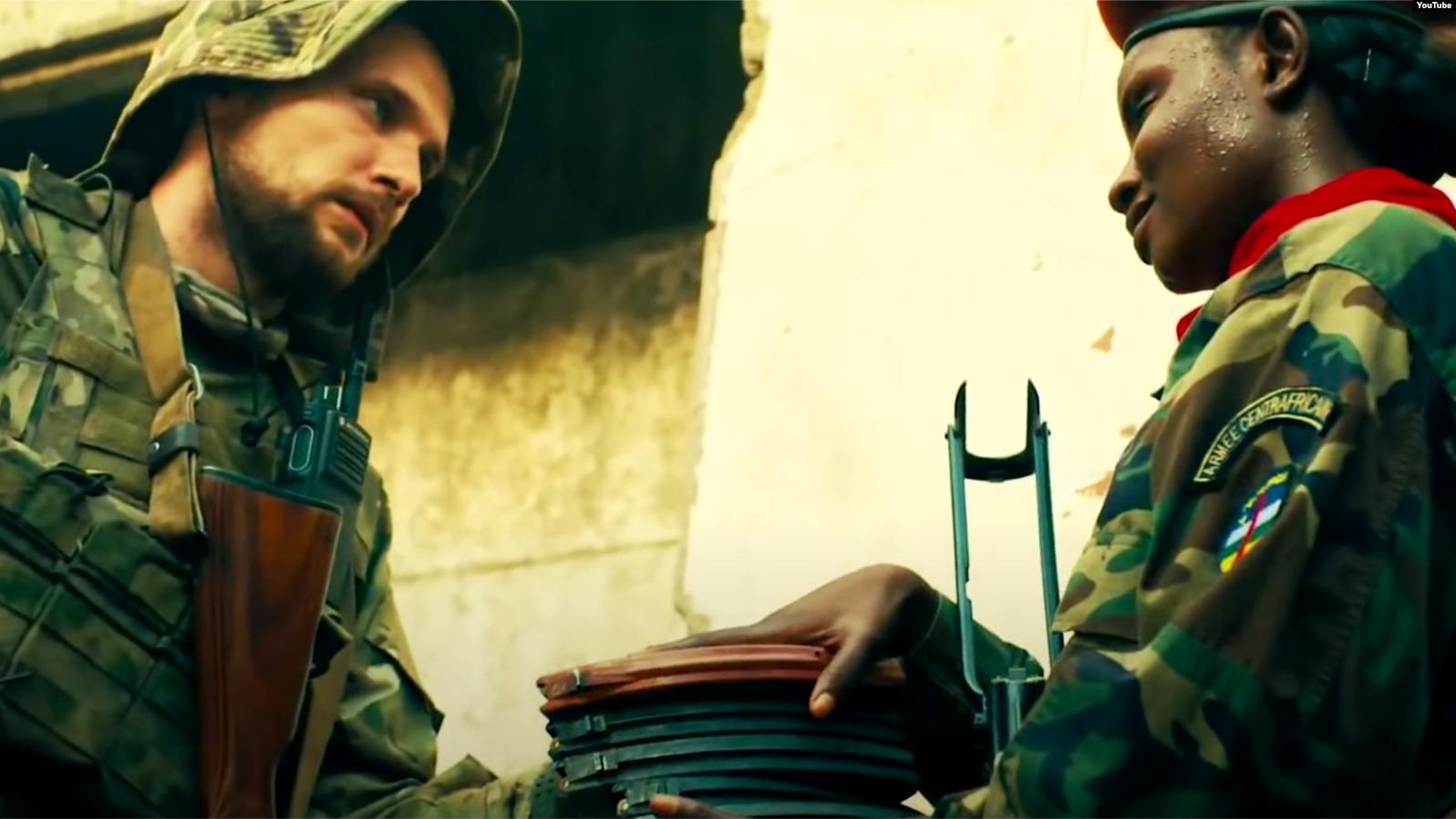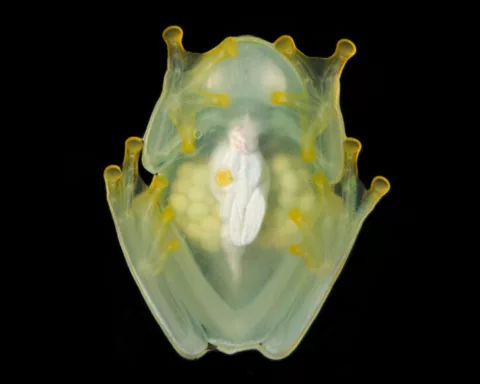The latest entry into the genre of high-energy, kinetic war-action films has arrived in the form of The Tourist, a movie that debuted in Russia in a midweek broadcast on state-funded NTV.
Set in the Central African Republic, the film features a group of heroic Russian military trainers sent to bolster the professionalism of beleaguered security forces until they’re caught up in an attempted coup on the eve of a presidential election.
With tight-framed shots of furrowed brows, curling cigarette smoke, Kalashnikov magazine clips, and bodies flung skyward by explosions, the movie’s cinematography, soundtrack, and even at times canned dialogue is virtually indistinguishable from scores of Hollywood action flicks. Think of the Arnold Schwarzenegger film Commando but set in Africa, with Russian and French dialogue.
There’s a subtext to this film, however, that sharp-eyed observers were quick to pick up on: a gauzy look at Russian mercenaries who in real life play an increasingly outsized role as tools for official foreign policy goals.
The film itself is littered with clues pointing to the direct involvement of one or more private military companies. In fact, according to the online news outlet Meduza, it appears to have been financed by the parent company that is widely believed to control Russia’s most notorious private military organization.
What is Vagner?
In recent years, researchers, journalists, open-source sleuths, not to mention United Nations investigators, have documented private Russian companies conducting operations in places like Ukraine, Syria, Libya, and Mozambique.
The Central African Republic, in particular, has been the focus of intense scrutiny amid concerns that private soldiers from a Russian company known as Vagner have come to dominate the government’s security forces.
In 2018, the country’s government signed a formal contract with Vagner to train the national military and help battle an insurgency that erupted five years earlier.
Outside the capital, Bangui, the countryside is largely a chaotic vacuum, with militias and insurgent groups vying for control of lucrative natural resources.
French, Russian, and other reports say that the several hundred Russian soldiers who deployed there have been overseeing one or more mines where diamonds and gold are dug up, as well as the export of valuable timber.
And they have been linked to atrocities in the country.
According to a United Nations report in March, experts have recorded “serious violations of human rights” including “mass summary executions, arbitrary detentions, torture during interrogation, enforced disappearances, forced displacement of the civilian population, [and] indiscriminate targeting of civilian facilities,” among other things.

The violations, the report said, were “attributable to private soldiers operating jointly with the Central African Armed Forces and, in some cases, with United Nations peacekeeping forces.”
On May 3, two weeks before the Russian film had its public debut in the Central African Republic, a report by Radio France International found that Vagner soldiers were allegedly involved in gang rapes, robberies, and the killings of civilians.
Private military companies “give the Kremlin and Russian elites the strategic latitude they need to operate beyond the dictates of international humanitarian law,” said Candace Rondeaux, a researcher at the Center on the Future of War at Arizona State University.
‘Putin’s Chef’
Vagner is linked to the St. Petersburg businessman Yevgeny Prigozhin, whose Kremlin catering contracts led to him being dubbed “Putin’s chef.” He’s funded the notorious “troll factory” that churned out disinformation that U.S. officials say was aimed at sowing discord during U.S. elections.
He was indicted in the United States in 2018 on conspiracy and other charges. . Two years later, the U.S. Justice Department dropped its case against him.
Among the more egregious allegations linked to Vagner in the Central African Republic: the July 2018 killings of three Russian journalists who were in the country to make a documentary about the company’s activities. Investigators from a research organization funded by exiled oil tycoon Mikhail Khodorkovsky alleged that Vagner mercenaries and official police units were responsible.
In Syria, Vagner mercenaries, and companies linked to Prigozhin, have been involved in secret deals to control the export of oil from facilities there. Vagner soldiers have been linked to at least one gruesome torture of a detainee, in which a video shows Russian men using a sledgehammer to crush the hand of local man whose body is later burned.
Citing three unnamed people, including a film consultant and a former Prigozhin employee, Meduza reported that Prigozhin indeed financed the film, with the goal of whitewashing the company’s reputation.

Two people who spoke to Meduza, and one to the BBC, said it appeared that actual professionally trained private soldiers were cast in the film, as extras or secondary characters, alongside regular actors. Some of the equipment and vehicles used in the film were identical to vehicles used by Vagner units in Syria.
The film’s closing credits do not mention Prigozhin or any of his companies, saying only that the film’s producer is a company called Parity Film LLC, which was registered in St. Petersburg in February 2021.
The same company is also producing a film about the outbreak of fighting in eastern Ukraine, in 2014, according to the BBC.
An e-mail sent to Prigozhin’s main company mailing address in St. Petersburg was not immediately replied to. But Prigozhin responded to queries from a Meduza reporter about the film by calling her an “enemy of the people” who “in Soviet times” would be shot.
Cessna Clues
There’s another clue in the film pointing to the direct involvement of Prigozhin companies: a Cessna light aircraft whose identifying markers are visible, mistakenly, in at least one short segment of the film, according to RFE/RL’s Russian Service.
Using aircraft databases and corporate records, RFE/RL’s Russian Service and Current Time, the Russian-language network run by RFE/RL in cooperation with VOA, determined that an aircraft with identical markings was registered to several of Prigozhin’s companies, at a minimum, between December 2017 and April 2018.
Still other observers noticed what appear to be intentional clues — known informally as “Easter eggs” in popular culture — that appeared aimed at signaling to knowledgeable viewers.
One is a close-up of a sledgehammer, resting against the wheel of a Russian truck.






